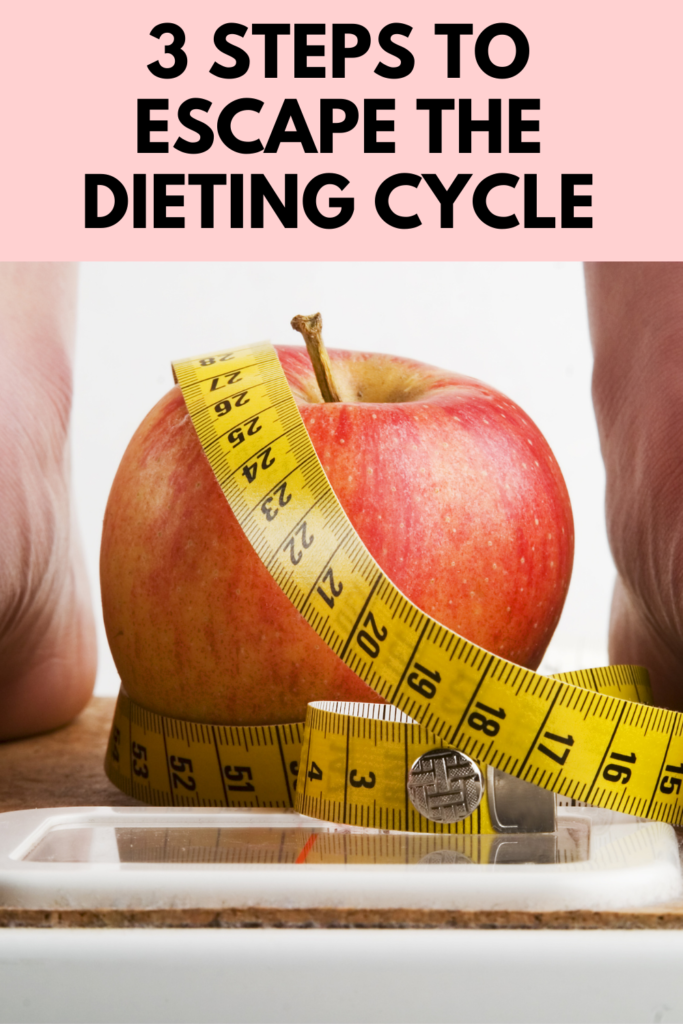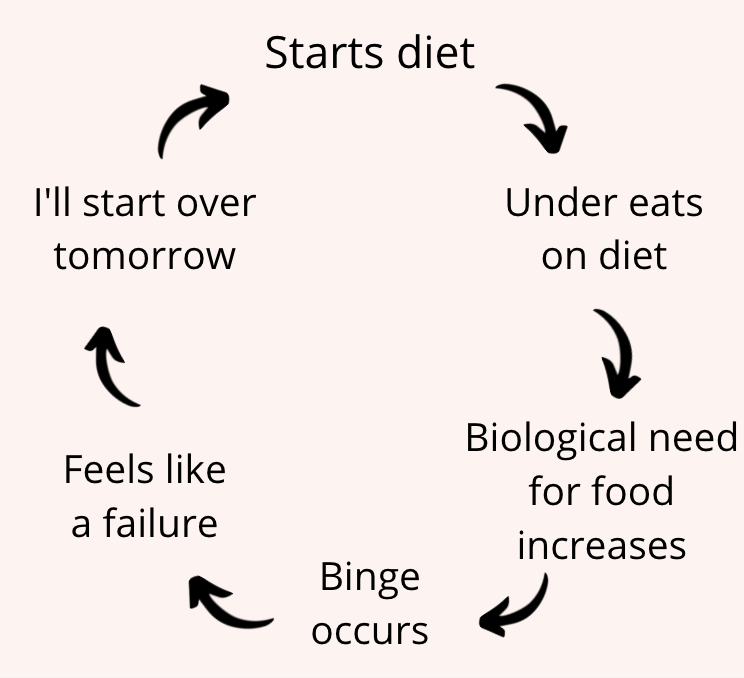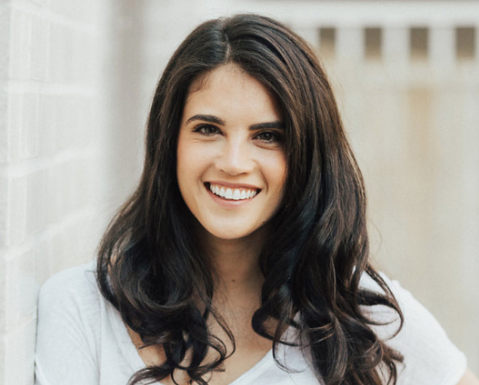3 Steps to Escape the Dieting Cycle
If you’re a chronic dieter, tired of jumping from one diet to another without seeing results, this blog post is for you! These are the must-take 3 steps to escape the dieting cycle so you can learn what to eat to feel your best and achieve ultimate health!

If you’re reading this, you may be ready to stop dieting. But it’s hard. In today’s culture, dieting is glorified. We’re constantly bombarded by messages that getting thinner is the cure-all for your health.
And even though it’s beginning to become less sexy to “diet” in the traditional term of the word, there are still plenty of “lifestyles” that are truly diets hiding under the lifestyle disguise. (I’m talking about you intermittent fasting and keto.)
But the thing about diets is that they don’t work! Sure, you may lose some weight (fairly quickly), but 2/3 of dieters REGAIN the weight they lost. And regain even MORE weight than was originally lost. This is physiological. It’s not due to a lack of willpower!
Low calorie diets (which is how most achieve weight loss) cause your body to hold on to energy (calories), so your energy expenditure declines as your body shrinks. This means you need fewer and fewer calories each day. But you can’t keep eating less and less… hence the weight regain.
And what happens once you regain weight? Eventually you start another diet to lose the weight again… and again… and again!
So what’s the dieting cycle an how can you escape the dieting cycle once and for all to fully prioritize your health? Let’s find out…
What is the dieting cycle?
The dieting cycle is a cycle of going from restrictive diet to over-eating, and vowing to start over again. Here’s a quick image for you…

Let’s explore each stage of the dieting cycle…
1. You start a diet that requires you to under-eat
Most diets, by definition, require you to under-eat. That caloric deficit is what leads to weight loss. Most diets cause you to drastically cut calories, which leads to even quicker weight loss.
2. Due to caloric restriction, your biological need for food increases.
When under-eating, your biological need for food increases. This is because your body knows how much you need to eat. When you try to manipulate this number by under-eating or depriving yourself, your body thinks you’re in STARVATION MODE.
So what does your body do? It’s NORMAL for your body to fight back an want to eat more. This leads to the next stage…
3. Binging occurs
You can’t help it. Deprivation breeds over-eating and even binging.
You may feel out of control around food. You may feel like you can’t stop.
This is not your fault, but as a result, it’s normal for the next stage to occur…
4. You feel like a FAILURE and GUILTY for eating/binging
Because you’ve been wired by diets that you shouldn’t eat (even when hungry). So naturally, if you were to over-eat, you’d feel guilty and like you “messed up” your diet.
However, guilt is not an ingredient in your food. And it doesn’t belong at the table (or couch, or desk, or anywhere) – especially if you’ve overeaten.
Another however, when you’re so invested in the “this is the diet that’s going to help me lose weight and get healthy once and for all!!!” you naturally vow to start over tomorrow morning…
5. You vow to start over
You promise yourself you won’t get derailed. You won’t overeat. You’ll be “good.”
You just need more willpower, focus, stamina, prep time, etc. in order for the diet to work for you.
But you didn’t fail the diet. The diet failed you. But we often don’t recognize this in the moment, so we head back to #1… you start a diet that requires you to under-eat (again).
Why the Diet Cycle is Harming Your Health
As much fun as this cycle is (NOT!), it continues to pull you into its cyclone and it’s hard to get out. You’re not alone. In reality, it took me years to see the light and understand that no quick fix diet plan was going to work for me long-term because I was eliminating all of my favorite foods.
So instead of trying to convince you that this cycle isn’t great for your waistline, mental health or physical health, I’m going to give you straight facts…
Dieters have higher…
- Triglycerides (fat in your blood)
- Blood pressure
- Body dissatisfaction
- Emotional eating
- Loss-of-control eating or binging
- Disordered eating
So not only is staying stuck in this cycle harming your mental health, leaving you obsessing over food, but it’s also doing more harm than good for your physical health.

3 Steps to Escape the Dieting Cycle
Now that you know what the diet cycle is, perhaps you can identify that you’ve been here… maybe even more than once.
But the good news is that to improve your health, you don’t have to stay where you are!
Here are 3 steps to escape the diet cycle:
- Commit to eating enough for your body
- Reject the tools of dieting to measure progress (scale,
- Be compassionate toward yourself
Escape the Dieting Cycle Step 1: Eat enough for your body
As explained above, a big part of why the diet cycle continues (and continues) is because you’re under-eating on a diet. This goes against your biological protection mechanisms dating back to when our ancestors were hunters and gatherers.
If you’re constantly hungry you’re going to constantly be thinking about food until you finally “give in.” The best way to stop this is to eat enough for your body. Stop the cycle before it starts, essentially.
ACTION TIP: The best way to ensure you’re eating enough for your body after a period of dieting is to get in touch with your hunger cues. Eat when you’re hungry.
Your body’s inner calorie counter (your hunger cues) will tell you when you need to eat. If you honor these cues (especially with balanced meals) you’ll be sure to eat enough for your body. Remember: under-eating is not helping you!
However, if you have a long-standing history of dieting and disordered eating, eating on a schedule in the beginning may be helpful for you to regain your hunger cues. In this case, working with a registered dietitian is preferred because he or she will know how to personally guide you.
ACTION TIP: Once you start eating enough, try to include more satisfying foods into your meals.
This step can feel scary, but it’s essential to make peace with food and truly stop dieting. This is something I cover in the Nutrition Training Program – so hop on the waitlist if you’re interested to never diet again, but still feel great while eating your favorite foods!
Escape the Dieting Cycle Step 2: Reject the tools of dieting to measure progress
Many people start a diet to improve their health. Perhaps your doctor told you to lose some lbs to improve your cholesterol levels. However, diet success is often very numerical (weight, measurements, calories consumed, macros, etc.). But, we don’t have the numbers that matter when it comes to our HEALTH. Therefore, all you’re measuring is a superficial number that could actually have negative effects on your actual health.
The best thing you can do to escape the dieting cycle, therefore, is to reject the tools of dieting, including:
- Weighing yourself
- Counting calories
- Tracking macros
- Calculating points
To actually measure what’s improving your health, try measuring things like:
- Energy levels
- Sleep quality
- Stress level
- Exercise ability
- Behavioral changes like eating more vegetables and fruits
Making behavioral changes to improve your health is what matters – not superficial numbers!
But ditching the scale can be hard, so be sure to seek support!
Escape the Dieting Cycle Step 3: Be compassionate toward yourself
For many of my clients, they’ve been dieting for years. So escaping the diet cycle isn’t easy.
But it’s often necessary.
Instead of judging yourself and giving yourself a hard time, try being more compassionate towards yourself and your body.
When you start to focus on how you FEEL over everything else, your weight will end up where it’s supposed to be.
Building self-compassion is helpful because it allows you to be gentler with yourself.
Instead of feeling guilty the next time you overeat, you’ll be able to examine WHY through a more compassionate lens.
Instead of beating yourself up for “falling off plan,” you’ll be able to use logic and reasoning to see why.
Instead of throwing in the towel after breaking the rules, you’ll be able to clearly reason with science why your rules have holes.
It’s hard to do this on your own, so I again invite you to join the waitlist for the Nutrition Training Program, my signature online course that teaches you what and how to eat to feel your best without dieting.
The next time you feel pulled to start another diet (you know, because your friends/co-worker/sister/mother are), remember this blog post and share it with someone you love!
XO



 Hi there!
Thanks for stopping by! I'm Chelsey, an online Registered Dietitian, recipe developer, budding photographer, and coffee addict! My mission is to help you feel good through food by answering the question "What should I eat?" Let's make nutrition approachable!
I hope you enjoy my personal collection of simple, healthy, food allergy friendly and nutritiously delicious recipes, plus tips and tons of tricks that will help YOU live a nutritionally-balanced life! I look forward to getting to know you better...
Hi there!
Thanks for stopping by! I'm Chelsey, an online Registered Dietitian, recipe developer, budding photographer, and coffee addict! My mission is to help you feel good through food by answering the question "What should I eat?" Let's make nutrition approachable!
I hope you enjoy my personal collection of simple, healthy, food allergy friendly and nutritiously delicious recipes, plus tips and tons of tricks that will help YOU live a nutritionally-balanced life! I look forward to getting to know you better...







